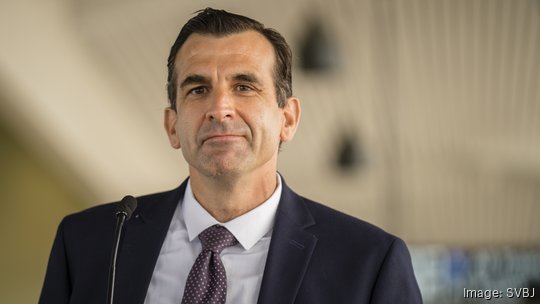
San Jose is dipping its toe into cryptocurrencies as part of a complex plan to help low-income residents pay for internet access.
As part of the arrangement, the city is teaming up with Helium Systems Inc., a San Francisco company that offers low-speed wireless network access that companies like Lime use to connect their scooters and other smart devices to the internet, Mayor Sam Liccardo announced Wednesday. Wireless transmitters compatible with Helium's network double as cryptocurrency mining devices; the startup typically pays owners of the devices to deploy and operate them with the currency they generate, which it dubs HNT.
In this case, the California Emerging Technology Fund will purchase about 20 Helium-compatible transmitters — using a $10,000 check from the mayor's office — and give them to the mayor's office to deploy. CETF, a state-sponsored nonprofit that seeks to increase internet access and adoption among underserved communities, will convert the HNT the transmitters mine into dollar-denominated prepaid gift cards. The mayor's office plans to distribute those gift cards, which are expected to be worth $120 each, to more than 1,300 low-income families in San Jose to use to pay for a year's worth of discounted internet access.
Comcast offers a $10 per month broadband service it calls Internet Essentials for such households.
"Over 50% of San Joseans who do not have access to broadband internet at home cited cost of broadband internet as the number one factor," Jordan Sun, San Jose's chief innovation officer, said in an emailed statement. "Even at $10 per month, broadband internet remains unreachable for many low-income families."
The partnership, which the partners are rolling out as a six-month pilot program, is the first of its kind in the U.S., Sun said.
About 91% of San Jose households have a broadband Internet subscription, versus 82% in the United States as a whole, according to Census data. But there remain persistent pockets of people both locally and nationwide who either don't have access to broadband or can't afford it.
The city wanted to expand internet access
Under the program, the city and CETF are expecting to mine about $156,000 worth of HNT tokens with their transmitters. Helium's currency is currently trading around $17 each, according to CoinMarketCap.com, so the trasmitters will have to generate more than 9,000 tokens to meet the program's goals. One hundred percent of the revenues from those tokens will go toward the debit cards, Sun said in the emailed statement.
The city turned to Helium because it wanted to find a way to reduce the cost of broadband for low-income residents without raising taxes or soliciting funds from donors, Sun said. It started exploratory discussions with Frank Mong, Helium's chief operations officer, in December.
For Helium, the transmitters offer it a chance to expand its network, which operates on a different frequency than Wi-Fi or current cellular networks. The company charges companies for the data they transmit over its system. Among other things, its network can support devices that monitor air quality, detect fires and water leaks, and monitor climate conditions, the city said in its news release announcing the program.
"To democratize and decentralize the internet is the driving force behind the Helium Network and this program with the City of San José brings that mission to life,” Helium CEO Amir Haleem said in the release.
Crytocurrency mining is notorious for requiring copious amounts of electricity. But when mining HNT, Helium-compatible transmitters use a small fraction of the energy needed for bitcoin, the most prevalent digital currency, according to the company and the city.
"The amount of energy used by a (transmitter) is that of an LED light bulb," Davis said.
The city is still looking for residents and businesses to volunteer to host the Helium transmitters, which it calls hotspots, even though they don't transmit Wi-Fi signals. To sign up for one, readers can visit this page.





